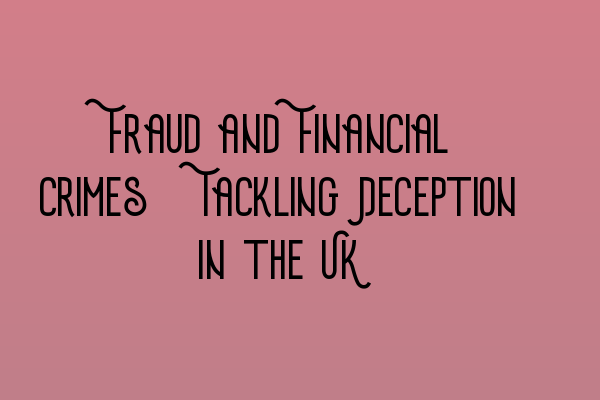Fraud and Financial Crimes: Tackling Deception in the UK
As the Solicitors Qualifying Exam (SQE) Criminal Law & Practice Law UK, we understand the importance of addressing the rise in fraud and financial crimes within the country. These crimes not only result in significant financial losses but also erode public trust in the financial system, making it crucial for legal professionals to be well-versed in tackling deception effectively. In this article, we will explore the various aspects of fraud and financial crimes in the UK and discuss the measures taken to combat them.
Understanding Fraud and Financial Crimes
Fraud and financial crimes encompass a wide range of deceptive practices aimed at unlawfully obtaining or misusing financial resources. These crimes can be committed by individuals, organizations, or even large-scale criminal networks. Some common types of fraud include identity theft, investment scams, credit card fraud, money laundering, and insurance fraud, among others.
With the increasing digitalization of financial transactions, cybercrime has become a major concern. Criminals exploit vulnerabilities in online systems, carry out phishing attacks, and engage in ransomware attacks to defraud individuals and businesses alike. It is crucial for legal professionals to stay updated on the evolving techniques used by fraudsters and be able to effectively navigate through complex digital evidence.
Tackling Fraud and Financial Crimes
The UK has implemented a robust legal framework to combat fraud and financial crimes. Legislation such as the Fraud Act 2006 and the Proceeds of Crime Act 2002 provides the legal basis for prosecuting individuals involved in deceptive practices. Additionally, the Financial Conduct Authority (FCA) and the Serious Fraud Office (SFO) play a key role in investigating and prosecuting fraud cases.
Legal professionals specializing in criminal law and practice play a vital role in the effective detection and prosecution of fraud and financial crimes. They work closely with law enforcement agencies, financial institutions, and other stakeholders to gather evidence, build strong cases, and ensure that justice is served.
Importance of Legal Professionals in Fraud Cases
Legal professionals with expertise in fraud and financial crimes possess the necessary skills to navigate the complex legal landscape associated with these offenses. They understand the intricacies of fraud investigations, including gathering evidence, conducting interviews, and presenting compelling arguments in court.
At SQE Criminal Law & Practice Law UK, we offer comprehensive SQE 1 and SQE 2 preparation courses that cover all aspects of fraud and financial crimes, ensuring that aspiring legal professionals are well-equipped to tackle these offenses effectively. Our SQE 1 Practice Exam Questions and SQE 1 Practice Mocks FLK1 FLK2 resources can help you enhance your knowledge and test your understanding of fraud-related topics.
Conclusion
Fraud and financial crimes pose a significant threat to society and the economy, necessitating a strong legal response. Legal professionals with expertise in fraud and financial crimes play a crucial role in investigating, prosecuting, and ultimately deterring such offenses. At SQE Criminal Law & Practice Law UK, we strive to equip aspiring legal professionals with the necessary skills and knowledge to combat deception effectively.
If you are looking to prepare for your SQE exams, we offer comprehensive SQE 1 and SQE 2 preparation courses to help you succeed. Stay updated with the latest SRA SQE Exam Dates and take advantage of our resources to enhance your preparation.
For more information:
- SQE 1 Practice Exam Questions
- SQE 1 Practice Mocks FLK1 FLK2
- SQE 2 Preparation Courses
- SQE 1 Preparation Courses
- SRA SQE Exam Dates
